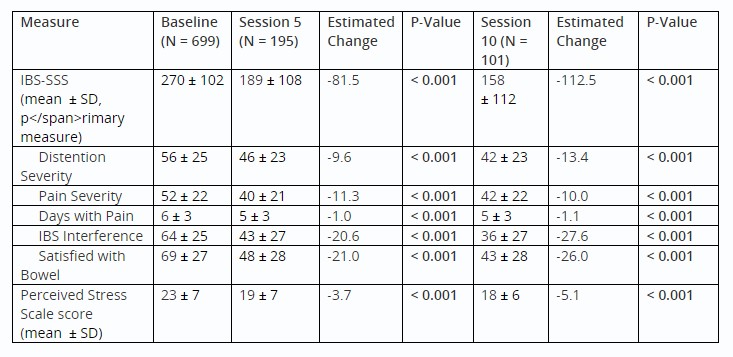Oral Paper Presentation
Annual Scientific Meeting
Session: Plenary Session 2A - Functional / Esophagus
19 - Efficacy of a Digital Prescription Mobile Application for Adults With Irritable Bowel Syndrome
Tuesday, October 24, 2023
8:30 AM – 8:40 AM PT
Location: Ballroom A

Mythili Pathipati, MD
Massachusetts General Hospital
Boston, MA
Presenting Author(s)
Award: Outstanding Research Award in the Functional Bowel Disease Category (Trainee)
Mythili Pathipati, MD1, Luisa Scott, PhD2, Allen Griser, MS3, Kyle Staller, MD, MPH1
1Massachusetts General Hospital, Boston, MA; 2Mahana Therapeutics, Austin, TX; 3Mahana Therapeutics, Charlotte, NC
Introduction: Mahana TM IBS is a Food and Drug Administration-cleared prescription mobile application that delivers 3 months (10 sessions) of gut-directed cognitive behavioral therapy (CBT) to adults ≥22 years old with irritable bowel syndrome (IBS). Psychological therapies are recommended for IBS, however 60% of gastroenterologists in the United States lack access to a GI psychologist. Using real-world user data, we assessed whether gut-directed CBT delivered digitally was effective in IBS management.
Methods: We studied patients who used Mahana TM IBS between August 2021 and April 2023. We collected demographic information including age, IBS-subtype, IBS severity, self-reported anxiety/depression, and prescription source. Symptom severity was assessed using the IBS Symptom Severity Scale (IBS-SSS; where a decrease of ≥50 points is clinically significant) at baseline, session 5, and session 10 (final session). Users completed the perceived stress scale (PSS), a psychological instrument measuring perception of stress. The primary outcome was change in IBS-SSS score, analyzed in a mixed model repeated measures analysis. Univariate and multivariate analyses examined factors associated with treatment adherence (completion of at least 5 sessions) and successful treatment (decrease in IBS-SSS of ≥50 points).
Results: A total of 699 patients were included in the study. (Figure 1). Median age was 41 years, median IBS-SSS was 279 (moderate severity), and 43% of patients had self-reported anxiety/depression. 54% of patients received a prescription from their healthcare provider and 46% received a prescription via a direct-to-consumer third party telehealth encounter. The estimated change in IBS-SSS after session 5 was -81.5 (p = < 0.001) and after session 10 was -112.5 (p = < 0.001) (Table 1). When age, IBS-subtype, baseline IBS-SSS, and baseline PSS were controlled for, multivariate analyses showed that anxiety/depression and older age were significantly associated with adherence to the program (OR 1.43; 95% CI 1.01-2.03 and OR 1.12; 95% CI 1.02-1.24, respectively) and higher IBS-SSS was associated with response to the program (OR 1.07; 95% CI 1.03-1.10).
Discussion: Use of a digital mobile application for gut-directed CBT improves overall and individual symptoms of IBS after both 5 and 10 weeks of use. Digital health applications have the potential to democratize specialty services such as CBT and allow integrated care to scale for patients with IBS.


Disclosures:
Mythili Pathipati, MD1, Luisa Scott, PhD2, Allen Griser, MS3, Kyle Staller, MD, MPH1, 19, Efficacy of a Digital Prescription Mobile Application for Adults With Irritable Bowel Syndrome, ACG 2023 Annual Scientific Meeting Abstracts. Vancouver, BC, Canada: American College of Gastroenterology.
Mythili Pathipati, MD1, Luisa Scott, PhD2, Allen Griser, MS3, Kyle Staller, MD, MPH1
1Massachusetts General Hospital, Boston, MA; 2Mahana Therapeutics, Austin, TX; 3Mahana Therapeutics, Charlotte, NC
Introduction: Mahana TM IBS is a Food and Drug Administration-cleared prescription mobile application that delivers 3 months (10 sessions) of gut-directed cognitive behavioral therapy (CBT) to adults ≥22 years old with irritable bowel syndrome (IBS). Psychological therapies are recommended for IBS, however 60% of gastroenterologists in the United States lack access to a GI psychologist. Using real-world user data, we assessed whether gut-directed CBT delivered digitally was effective in IBS management.
Methods: We studied patients who used Mahana TM IBS between August 2021 and April 2023. We collected demographic information including age, IBS-subtype, IBS severity, self-reported anxiety/depression, and prescription source. Symptom severity was assessed using the IBS Symptom Severity Scale (IBS-SSS; where a decrease of ≥50 points is clinically significant) at baseline, session 5, and session 10 (final session). Users completed the perceived stress scale (PSS), a psychological instrument measuring perception of stress. The primary outcome was change in IBS-SSS score, analyzed in a mixed model repeated measures analysis. Univariate and multivariate analyses examined factors associated with treatment adherence (completion of at least 5 sessions) and successful treatment (decrease in IBS-SSS of ≥50 points).
Results: A total of 699 patients were included in the study. (Figure 1). Median age was 41 years, median IBS-SSS was 279 (moderate severity), and 43% of patients had self-reported anxiety/depression. 54% of patients received a prescription from their healthcare provider and 46% received a prescription via a direct-to-consumer third party telehealth encounter. The estimated change in IBS-SSS after session 5 was -81.5 (p = < 0.001) and after session 10 was -112.5 (p = < 0.001) (Table 1). When age, IBS-subtype, baseline IBS-SSS, and baseline PSS were controlled for, multivariate analyses showed that anxiety/depression and older age were significantly associated with adherence to the program (OR 1.43; 95% CI 1.01-2.03 and OR 1.12; 95% CI 1.02-1.24, respectively) and higher IBS-SSS was associated with response to the program (OR 1.07; 95% CI 1.03-1.10).
Discussion: Use of a digital mobile application for gut-directed CBT improves overall and individual symptoms of IBS after both 5 and 10 weeks of use. Digital health applications have the potential to democratize specialty services such as CBT and allow integrated care to scale for patients with IBS.

Figure: Figure 1. Mahana Application Interface and Flow Diagram of Program Completion

Table: Table 1. Primary and Secondary Outcome Data Over Time in Mixed Model Repeated Measures Analysis*
*The primary quantitative endpoint, IBS-SSS, was analyzed in a mixed model repeated measures analysis with unstructured within-person covariance among the repeated assessments. Adjusted means for IBS-SSS at each study timepoint change in IBS-SSS from pretreatment (baseline), midway through the program (session 5), and completion of the program (session 10) and was estimated by linear contrasts. The mixed model accounts for missing data when participants withdraw.
*The primary quantitative endpoint, IBS-SSS, was analyzed in a mixed model repeated measures analysis with unstructured within-person covariance among the repeated assessments. Adjusted means for IBS-SSS at each study timepoint change in IBS-SSS from pretreatment (baseline), midway through the program (session 5), and completion of the program (session 10) and was estimated by linear contrasts. The mixed model accounts for missing data when participants withdraw.
Disclosures:
Mythili Pathipati indicated no relevant financial relationships.
Luisa Scott: Mahana Therapeutics – Employee.
Allen Griser indicated no relevant financial relationships.
Kyle Staller: Anji Pharmaceuticals – Consultant. Ardelyx – Consultant. Gelesis – Consultant. GI Supply, a Laborie company – Consultant. Ironwood Pharmaceuticals – Grant/Research Support. ReStalsis Health – Consultant. Sanofi – Consultant. Urovant Sciences – Grant/Research Support.
Mythili Pathipati, MD1, Luisa Scott, PhD2, Allen Griser, MS3, Kyle Staller, MD, MPH1, 19, Efficacy of a Digital Prescription Mobile Application for Adults With Irritable Bowel Syndrome, ACG 2023 Annual Scientific Meeting Abstracts. Vancouver, BC, Canada: American College of Gastroenterology.

